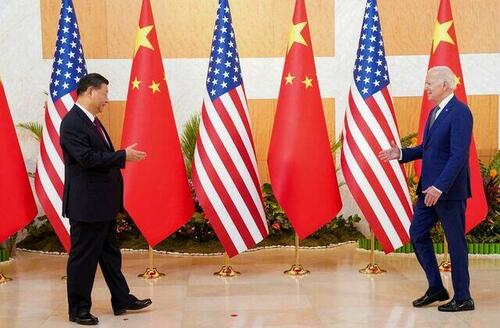
Next Wednesday Presidents Joe Biden and Xi Jinping plan to meet in San Francisco on the sidelines of the Asia-Pacific Economic Cooperation summit, a Friday White House statement has confirmed.
Biden's press secretary Karine Jean-Pierre outlined that the two will discuss the "continued importance of maintaining open lines of communication" and how the two large economic and military powers "can continue to responsibly manage competition and work together where our interests align, particularly on transnational challenges that affect the international community."
The November 15 meeting will be merely the second face-to-face meeting Biden has held with Xi since the start of his presidency, and will happen at the end of a year that witnessed spiraling relations, especially after the February spy balloon fiasco and shootdown.

High on the agenda alongside trade will be geopolitical flashpoint situations like Ukraine, the Israel-Hamas war, and of course security issues related with Taiwan.
The Taiwan situation deteriorated when last year then Speaker Nancy Pelosi made a brief visit to the self-ruled island, leading China to launch unprecedented encircling war drills, and to break off military-to-military communications with the Pentagon.
The Biden administration has since said it's determined to restore communications and cooperation on the military front, especially to avoid misunderstandings, as dangerous Chinese intercepts of US and allied spy planes over seas off China's coast have grown.
According to sources who spoke to the BBC:
Mr Biden is "determined" to restore those channels, US officials said, but China appeared to be "reluctant" to do so. "This is not the relationship of five or 10 years ago, we're not talking about a long list of outcomes or deliverables," one of the officials said.
"The goals here really are about managing the competition, preventing the downside of risk - of conflict, and ensuring channels of communication are open."
As for pressing geopolitical and foreign policy issues, Beijing has increasingly broken from the Western consensus on both Ukraine and Gaza.
"Distancing themselves from Israel, Russia and China have since focused on framing the war as part of a global power struggle against the U.S., with Israel reduced to little more than Washington’s regional pawn," The Wall Street Journal has pointed out.
Next Wednesday Presidents Joe Biden and Xi Jinping plan to meet in San Francisco on the sidelines of the Asia-Pacific Economic Cooperation summit, a Friday White House statement has confirmed.
Biden’s press secretary Karine Jean-Pierre outlined that the two will discuss the “continued importance of maintaining open lines of communication” and how the two large economic and military powers “can continue to responsibly manage competition and work together where our interests align, particularly on transnational challenges that affect the international community.”
The November 15 meeting will be merely the second face-to-face meeting Biden has held with Xi since the start of his presidency, and will happen at the end of a year that witnessed spiraling relations, especially after the February spy balloon fiasco and shootdown.

High on the agenda alongside trade will be geopolitical flashpoint situations like Ukraine, the Israel-Hamas war, and of course security issues related with Taiwan.
The Taiwan situation deteriorated when last year then Speaker Nancy Pelosi made a brief visit to the self-ruled island, leading China to launch unprecedented encircling war drills, and to break off military-to-military communications with the Pentagon.
The Biden administration has since said it’s determined to restore communications and cooperation on the military front, especially to avoid misunderstandings, as dangerous Chinese intercepts of US and allied spy planes over seas off China’s coast have grown.
According to sources who spoke to the BBC:
Mr Biden is “determined” to restore those channels, US officials said, but China appeared to be “reluctant” to do so. “This is not the relationship of five or 10 years ago, we’re not talking about a long list of outcomes or deliverables,” one of the officials said.
“The goals here really are about managing the competition, preventing the downside of risk – of conflict, and ensuring channels of communication are open.”
As for pressing geopolitical and foreign policy issues, Beijing has increasingly broken from the Western consensus on both Ukraine and Gaza.
“Distancing themselves from Israel, Russia and China have since focused on framing the war as part of a global power struggle against the U.S., with Israel reduced to little more than Washington’s regional pawn,” The Wall Street Journal has pointed out.
Loading…





